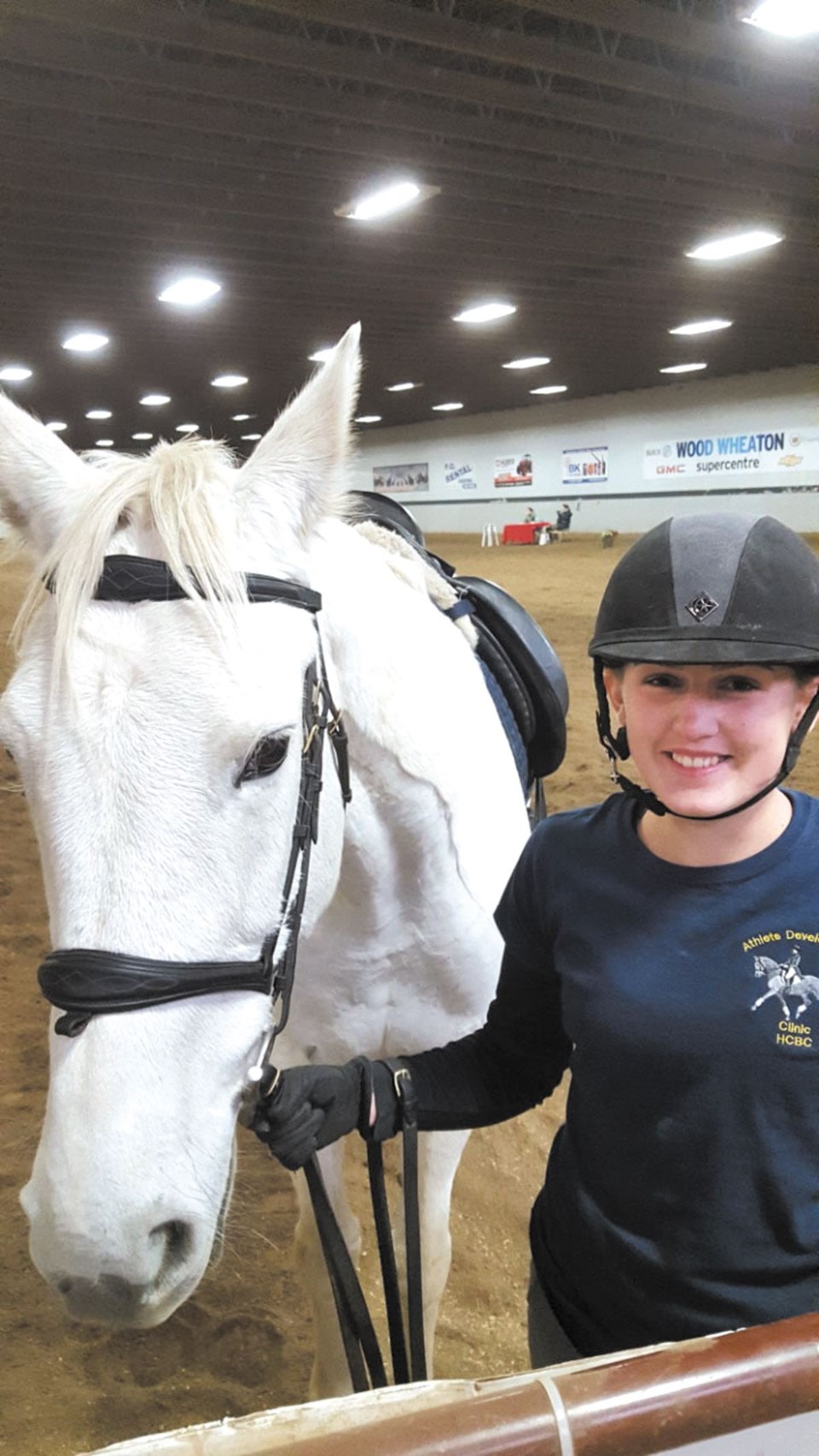In the sport of dressage, where the rider is judged on the ability to convince a horse to carry out instructions and follow a predetermined pattern while riding in an arena, unpredictability is inevitable.
Trying to contain an animal's wild spirit is no easy task.
It requires the rider to cover each course precisely, maintaining the right saddle posture to make subtle leg movements and rein adjustments to keep the line of travel straight and exert control on a living and breathing vehicle that weighs 700 kilograms.
For MacKenzie Ostberg, one of eight riders who took part in a two-day B.C. Summer Games Zone 7 and 8 athlete development clinic on the weekend, hearing the suggestions of high-performance equestrian coach Rochelle Kilberg over the public address system as she and her 15-year-old horse Vienna and seven other riders rode in the dirt arena at the Prince George Agriplex was an invaluable experience.
"The education part, not just with me riding, but listening to Rochelle coach the other girls definitely gives me a visual about what I need to work on and it helps a lot," said Ostberg.
"(Vienna) has a stiff left side so we worked on trying to do movements without having any issues while I'm riding her. She's a bit pokey, on the slow side, but she's very nice and very relaxed. She has lots of experience."
Now in her eighth year of riding, the 16-year-old Ostberg started competing in Pony Club events and gravitated to show jumping. She made the switch to dressage about a year-and-a-half ago when she started riding Vienna. Until this year she played volleyball and soccer but has put her love for team sports on hold to focus on getting to the B.C. Games.
"It's quite a bit more difficult than show jumping, I think, and when I was younger I never thought of it that way," said Ostberg.
Kilberg came up from her home in Langley to spend two full days in the arena at the Agriplex teaching riders dressage and show jumping techniques in the Horse Council BC-sponsored clinic. She offered coaching demonstrations and lectures, gave tips on mental preparation for competitions and shared her knowledge of horse nutrition and grooming. The opportunity to work with a coach of Kilberg's calibre is rare and expensive for riders from the north but it's critical to help them climb the competitive ladder.
Equestrian is featured in the B.C. Games every two years and Kilberg spoke to the riders and their coaches about what it will take for them to qualify for the Games in Cowichan next July and two years down the road when Prince George hosts the 2020 B.C. Summer Games.
Participation was limited to eight riders: Ostberg, Kylie Erickson, Myra Grant and Katya Zanozen of Prince George; Aspen and Havana Craig of Vanderhoof; Dylan Corrie of Terrace; and Bailey Rosic of Fort St. John made the invitation list.
Three of the riders - Erickson, Grant and Rosic - have declared they will compete in jumping, while the other five are vying for dressage spots. Each zone is limited to two riders in each discipline.
Due to short outdoor riding seasons, winter road conditions which keep horse trailers grounded five or six months each year, and the long distances involved in traveling to competitions, riders from the Kootenays, Vancouver Island and Northern B.C. have traditionally been underrepresented at the Games compared to their counterparts in the Okanagan and Lower Mainland zones. The clinic was a pilot project designed to help riders from remote areas try to overcome those odds and make the Games events more representative of all the regions.
Clinic organizer Bonnie Kennedy, whose daughters Jodie and Kerry were both B.C. Games equestrian medal winners in the 1990s, said the Games experience is like no other and should be accessible to athletes from all zones.
"We'd like more interest. They don't have to pay for travel, it's free competition, there's a lot of camaraderie and networking while you're there and it will be a lifetime memory - there are just so many positives to it," Kennedy said. "Just the goal-settting for the teenagers, it gives them a focus to work towards for two years."
For the 2018 Games, the window of opportunity to ride in qualifying events is narrow. The deadline is May 31 and the teams will be announced June 15. Ostberg will likely travel to the Okanagan in the spring for a qualifying event.
Ostberg's mother Katy competed in show jumping in the 1994 B.C. Summer Games in Kelowna and it remains one of the highlights of her riding career. As a 17-year-old representing Zone 8 she just missed the medal podium.
"It was a lot of fun, a cool experience," said Katy, 40, who still competes and recently became accredited by Equestrian Canada as a certified judge for hunter-jumper competitions. "I made some rookie competitive mistakes on the last day with the pressure but my horse did really well.
"Normally in the horse world you tend to do a lot of work on your own and you get put in with all the athletes in all the other sports and that changes the competitive environment. It's been around for a long time and it's a really good goal to shoot for and achieve. It's a big stepping stone for a lot of athletes."



.png;w=120;h=108;mode=crop)